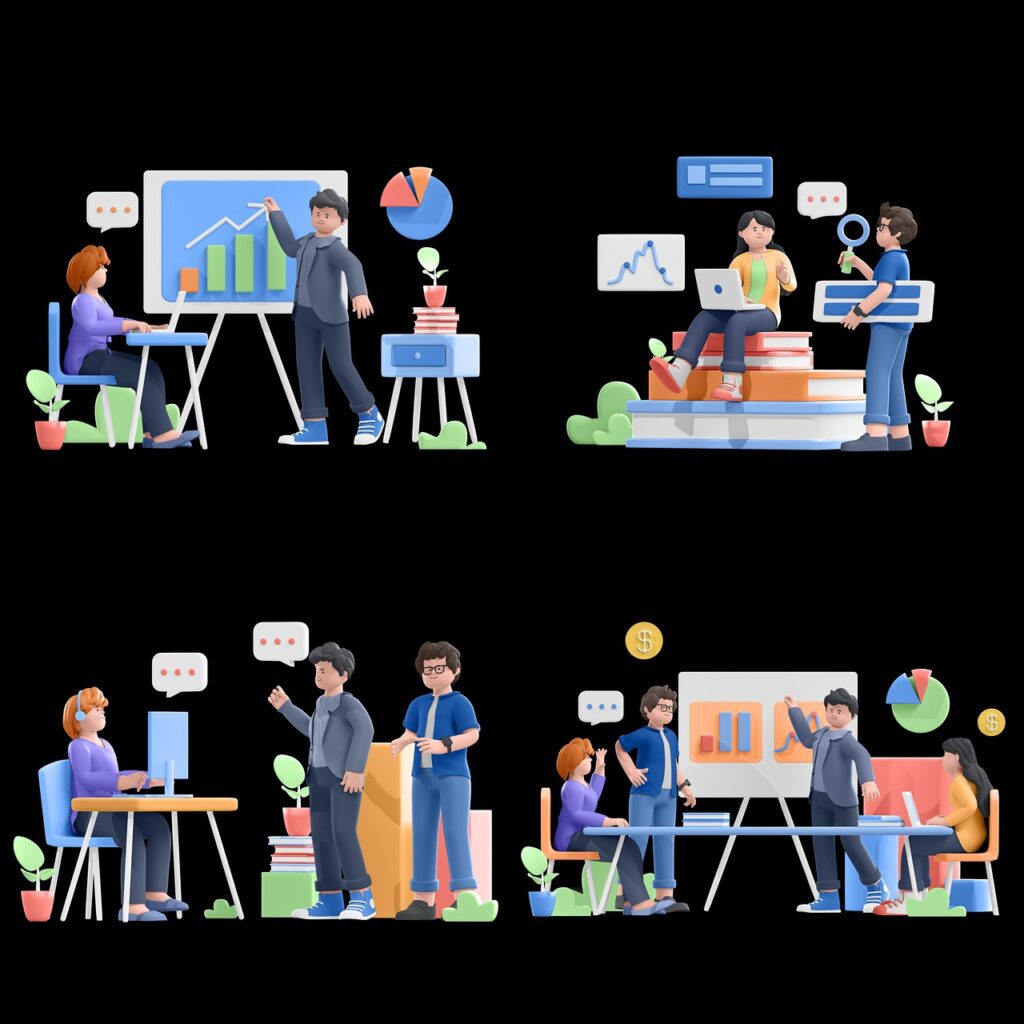If you’ve heard the term “lead generation” also called ‘lead gen’ for shot but aren’t sure what it means as a job, you’re not alone. Lead generation is a fast-growing field in sales and marketing—and it’s crucial for businesses of all sizes.
A job in lead generation involves identifying, cultivating, and qualifying potential customers for a company’s products or services. This role is crucial for driving sales and business growth.
What Is a Lead Generation Job?
Lead generation professionals are the dynamic force behind finding and attracting potential customers for businesses. Think of them as skilled “hunters” who fill the sales pipeline, ensuring that companies have a steady stream of opportunities to grow and thrive. Their role is crucial in keeping the sales engine running smoothly, as they continuously seek out and engage with prospects who might benefit from a company’s products or services.

The Role of Lead Generation Professionals
Lead generation professionals are responsible for identifying and qualifying potential customers. They use a variety of tactics and tools to find people who fit a company’s ideal customer profile and who are likely to be interested in what the company offers. By attracting high-quality leads, these professionals ensure that the sales team can focus on converting prospects into paying customers, driving business growth.
Common Job Titles
If you’re considering a career in lead generation, you might come across various job titles. Each role has its unique focus, but all share the common goal of driving new business opportunities. Here are some of the most common job titles you’ll encounter:
1. Lead Generation Specialist
Lead Generation Specialists are experts at finding and qualifying leads. They use various strategies, including online research, social media engagement, and email outreach, to identify potential customers. These specialists focus on generating high-quality leads that are ready for the sales team to engage with.
2. Sales Development Representative (SDR)
Sales Development Representatives (SDRs) specialize in the initial stages of the sales process. They reach out to potential customers through cold calls, emails, and social media to qualify leads and set up appointments or demos for the sales team. SDRs play a crucial role in building the sales pipeline and ensuring a steady flow of opportunities.
3. Business Development Representative (BDR)
Business Development Representatives (BDRs) focus on identifying new business opportunities. They work closely with the sales and marketing teams to develop strategies for entering new markets or expanding existing ones. BDRs often conduct market research, attend industry events, and build relationships with potential partners to drive growth.
4. Marketing Lead Generator
Marketing Lead Generators use marketing strategies to attract and engage potential customers. They create and execute campaigns, such as email marketing, content marketing, and social media advertising, to generate interest and capture leads. These professionals focus on building brand awareness and driving demand for a company’s offerings.
5. Demand Generation Associate
Demand Generation Associates work on creating demand for a company’s products or services. They develop and implement marketing programs that generate interest and inquiries from potential customers. These associates use data and analytics to optimize their strategies and ensure that they are attracting high-quality leads that convert into sales.
The Impact of Lead Generation Professionals
Lead generation professionals are vital to the success of any business. Because of them, companies can continuously fill their sales pipeline with qualified leads, which then enables sales teams to focus on what they do best—closing deals. This not only drives revenue growth but also helps businesses expand their customer base and enter new markets.

If you’re passionate about finding new opportunities and helping businesses grow, a career in lead generation could be an exciting and rewarding path. With the right skills and strategies, you can make a significant impact on a company’s success and help drive its growth to new heights.
Key Responsibilities of a Lead Gen Professional
Lead generation professionals spend most of their time in any or all of their time on identifying, qualifying, and nurturing potential customers to drive business growth. This involves prospecting, outreach, content creation, and managing relationships to convert leads into sales.
- Identifying and Qualifying Leads:
Identifying and qualifying leads is about finding potential clients and assessing their fit for your company’s offerings. This process involves research, evaluation, and using scoring systems to prioritize high-quality leads.
- Prospecting: Lead generation specialists are responsible for finding potential clients through various means such as online research, industry events, and networking. They evaluate these prospects to determine if they are a good fit for the company’s offerings.
- Qualification: This involves assessing the potential customer’s needs, budget, and authority to make purchasing decisions. Specialists often use scoring systems to prioritize leads based on their likelihood to convert into sales345.
- Generating Leads:
To be able to generate quality leads, a lead generation professional has to be proactive outreach through phone calls, emails, and social media to engage potential customers. It also involves creating compelling content and campaigns to attract and educate prospects about your products or services. Examples of these include:
- Outreach: Specialists reach out to potential clients through phone calls, emails, and social media to introduce the company’s products or services. The goal is to spark interest and initiate a conversation that could lead to a sale67.
- Content and Campaigns: They may also develop and execute marketing campaigns, including content creation, to attract and engage potential customers. This could involve creating blog posts, webinars, and other educational materials that demonstrate the value of the company’s offerings45.
- Nurturing Relationships:
Leads nurturing is crucial for building trust and rapport with potential customers. This involves consistent follow-up, providing valuable information, and using CRM tools to manage interactions and improve conversion rates. Examples of these include:
- Follow-Up: Lead generation specialists follow up with prospects to answer questions, provide additional information, and keep the company top-of-mind. This ongoing communication helps build trust and rapport, increasing the chances of converting a lead into a customer48.
- CRM Management: They use Customer Relationship Management (CRM) tools to track interactions with leads, manage data, and analyze the effectiveness of their outreach efforts. This helps in refining strategies and improving conversion rates5.
- Collaboration with Sales Teams:
Sales professionals rarely work in isolation, working in collaboration with other team members is common place in the industry.. Collaboration with sales teams ensures a smooth handoff of qualified leads. Effective communication and feedback loops help refine lead generation strategies and enhance the overall sales process.
- Handoff: Once a lead is qualified and ready to move forward, the specialist hands them off to the sales team. Effective communication between the lead generation specialist and the sales team is crucial to ensure a smooth transition and to provide the sales team with all the necessary information about the lead3910.
- Feedback Loop: Specialists also gather feedback from the sales team about the quality of the leads and use this information to improve their lead generation strategies.
Key Skills for Lead Generation Professionals
Lead generation is a critical function in any business, driving growth by identifying and nurturing potential customers. To excel as a lead generation professional, you need a blend of hard and soft skills that enable you to connect with prospects, spot opportunities, and effectively boost business growth. Here are the key skills required to thrive in a lead generation role:

Essential Hard Skills to Have
CRM Software
Proficiency in using CRM tools is crucial for managing leads and tracking interactions. Tools like HubSpot or Salesforce help organize lead data, automate follow-ups, and analyze performance.
Email/Cold Outreach Tactics
Knowledge of effective strategies for cold emailing and calling is essential for engaging prospects. Crafting compelling messages and understanding the best times and methods to reach out can improve response rates.
LinkedIn Sales Navigator
Expertise in using LinkedIn’s sales tools to identify and connect with potential leads is valuable. LinkedIn Sales Navigator helps target specific professionals and companies, enhancing the precision of your outreach efforts.
Google/Facebook Ads
Skills in managing paid advertising campaigns on platforms like Google and Facebook are important for attracting leads. Effective ad management involves creating compelling ad content, targeting the right audience, and optimizing campaigns for better results.
Data Analysis
The ability to analyze data using tools like Excel or Google Sheets is crucial for optimizing campaigns. Data analysis helps identify trends, measure performance, and make data-driven decisions to improve lead generation strategies.
Essential Soft Skills to Have
Communication Skills
Excellent verbal and written communication skills are essential for engaging with prospects and building relationships. Effective communication helps in understanding client needs, presenting solutions clearly, and maintaining strong connections throughout the sales process.
Research and Analytical Skills
The ability to research potential clients and analyze data is crucial for identifying high-quality leads. This involves understanding market trends, competitor activities, and customer behaviors to focus on the most promising opportunities.
Persistence and Resilience
Lead generation often involves facing rejection, so specialists need to be persistent and resilient. The ability to bounce back from setbacks and continue pursuing leads with enthusiasm is vital for long-term success.
Technical Proficiency
Familiarity with CRM software, marketing automation tools, and other technologies used in lead generation is essential. Proficiency in using tools like HubSpot or Salesforce to manage leads and track interactions can significantly enhance efficiency and effectiveness.
Industry Knowledge
A deep understanding of the company’s products or services and the industry landscape is necessary to effectively communicate value to prospects. This knowledge enables you to tailor your approach to each prospect’s unique needs and challenges.
Persistence
The resilience to handle rejection and continue pursuing leads is essential. Persistence helps maintain a positive attitude and keeps you motivated to achieve your goals.
Problem-Solving
The ability to overcome challenges and find creative solutions is vital. Problem-solving skills enable you to adapt to different situations, find innovative approaches, and improve processes continuously.
Time Management
Efficiently managing time to balance various tasks and meet deadlines is crucial. Good time management ensures that you can prioritize activities, stay organized, and maximize productivity.
Curiosity
A willingness to learn about different industries quickly is beneficial. Curiosity drives you to ask insightful questions, understand prospects better, and tailor your outreach efforts effectively.
Typical Career Paths of Lead Gen Specialist
A career in lead generation can be a stepping stone to various roles within sales and marketing. Successful lead generation specialists can advance to roles such as sales managers, marketing managers, or even executive positions, depending on their skills and experience.

A Day in the Life: What Do Lead Generation Professionals Do?
By now you should know that lead generation professionals play a crucial role in driving business growth by identifying and nurturing potential customers. Their tasks can vary depending on the company, but the typical workflow involves several key activities. Let’s dive into what a day in the life of a lead generation professional looks like.
Research & Identify Prospects
The day often begins with researching and identifying prospects. This involves finding businesses or individuals who might benefit from the company’s products or services. Lead generation specialists use various tools like LinkedIn, ZoomInfo, or Google to gather information and build targeted contact lists. This step is essential for ensuring that outreach efforts are directed towards potential customers who are likely to be interested in what the company offers.
Outreach & Engagement
Once prospects are identified, the next step is outreach and engagement. This involves reaching out to potential leads through cold emails or calls. Lead generation specialists also run social media and LinkedIn outreach campaigns to connect with prospects on a more personal level. Additionally, they manage paid ads on platforms like Facebook and Google to attract leads and increase visibility. Effective outreach requires a blend of creativity and persistence to capture the attention of potential customers.
Qualify & Hand Off to Sales
After initial contact, lead generation professionals qualify the leads to determine if they are a good fit for the company’s offerings. They ask qualifying questions to assess the lead’s budget, needs, and timeline. Once a lead is qualified and deemed “hot,” it is handed off to the sales team for further follow-up. This process ensures that the sales team focuses on leads that are most likely to convert into customers, optimizing their time and efforts.
Track & Optimize Campaigns
A significant part of the role involves tracking and optimizing campaigns. Lead generation specialists analyze data to understand which emails get the most replies and which ads convert the best. They use this information to adjust strategies and improve the effectiveness of their outreach efforts. Continuous optimization helps in achieving better results and driving more qualified leads to the sales team.
Who Hires Lead Generation Specialists?
Lead generation specialists are in demand across various industries, including:
- Tech Companies (SaaS, IT Services): These companies often rely on lead generation to drive growth and acquire new customers.
- Real Estate Agencies: Lead generation helps in finding potential buyers and sellers.
- Healthcare & Insurance: These industries need lead generation to attract new clients and patients.
- Marketing Agencies: Lead generation is a core service offered to clients to help them grow their businesses.
- E-commerce Brands: Lead generation helps in driving sales and expanding the customer base.
Salary & Career Growth
The career path for lead generation professionals offers ample opportunities for growth.
- Entry-Level (SDR/BDR): Salaries typically range from $40K to $60K, plus commissions.
- Mid-Level (Lead Generation Manager): Salaries can range from $60K to $90K.
- Senior (Director of Demand Generation): Salaries often exceed $100K.
A typical career path might involve starting as an SDR, moving up to a Lead Generation Manager, and eventually becoming the Head of Growth.
Is Lead Generation a Good Job for You?

Lead generation can be a rewarding career if:
- You Enjoy Talking to People: If you like engaging with others and writing persuasive emails, this role could be a great fit.
- You Like a Mix of Creativity and Data: The role requires both creative thinking and data analysis to optimize campaigns.
- You Thrive on Hitting Targets: If you are motivated by achieving goals and hitting sales targets, lead generation can be very satisfying.
However, it might not be the right fit if:
- You Hate Rejection: Lead generation involves facing rejection frequently, so resilience is key.
- You Prefer Solo Work with No Pressure: The role often involves working under pressure and collaborating with teams.
How to Get Started
If you’re interested in a career in lead generation, here are some steps to get started:
- Learn the Basics: Take free courses on platforms like HubSpot or LinkedIn to understand the fundamentals of lead generation.
- Practice Outreach: Gain experience through freelancing or internships to hone your outreach skills.
- Apply for SDR/BDR Roles: Many tech companies hire beginners for these roles, providing an excellent entry point into the field.
Pro Tip: Highlight any sales, marketing, or customer service experience on your resume, even if it’s informal. This can demonstrate your relevant skills and make you a stronger candidate for lead generation roles.
Lead generation is a dynamic and challenging field that offers numerous opportunities for growth and success. If you enjoy engaging with people and driving business growth, it could be the perfect career for you.
Final Verdict: A High-Growth, High-Reward Career
Lead generation jobs are fast-paced, measurable, and essential to business growth. If you’re competitive, love problem-solving, and want a career with clear advancement, this could be your perfect fit.
Want to test the waters? Try a free course:
[HubSpot’s Inbound Sales Certification] → [Link]“The best lead generators aren’t just good at selling—they’re great at listening.” 🎯

Leave a Reply